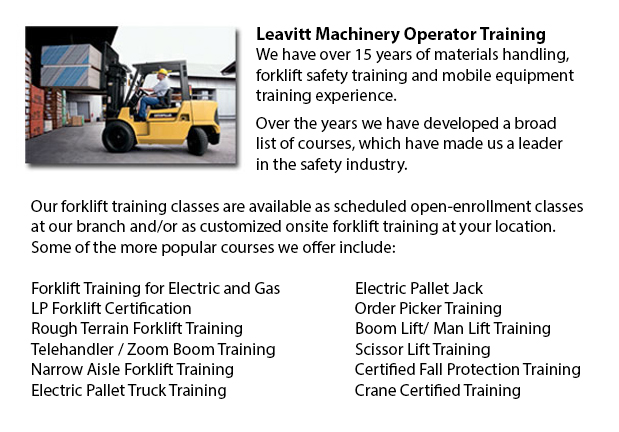
Richmond Hill Forklift Certification Schools - In North America, forklift certification is mandatory, making forklift training programs essential for both the company and their employees working as forklift operators. Forklift training focuses on health and safety concerns involved in forklift use. Safety issues affect both the operator of the forklift and workers and other people who are in the vicinity of the forklift. Businesses can be subject to penalties if they are caught with drivers who are un-certified during an inspection. There are a lot of convincing reasons why companies should follow forklift standards.
Most provincial, federal and state regulations need a worker evaluation of the skills necessary for forklift safety before the employer signs off that the worker is certified. There are several ways to get forklift training for workers, like online forklift training. Nevertheless, employers must be aware that forklift certification training is not "just a test". Right forklift training should include some areas of study, including theory and hands-on practice. Rules do not need employers to have an outside organization to certify forklift operators.
A quality forklift certification school would include a suggested program that comprises hands-on training that is performed on-site and classroom training. The training sessions in the classroom include videos, power point presentations, discussions and models. Students normally must write a test to check for subject matter understanding. Certificates of completion are issued upon successful completion of the class.
An evaluation of the student's use of the equipment comprises pre-operational equipment inspections, knowledge of job site hazards, a pass/fail operational test and operational instruction.
The following subject areas will normally be included in the training: Understanding regulations and legislations; Controls & Instrumentation; maneuvering and Steering; Engine maintenance and Operation; Visibility, Fork & Attachment Limitations; Stability, Rated Capacities, Inspection & Maintenance; Load Manipulation; Refueling; Pedestrians, and Hazardous Places & Rough Terrain Operation. There are also training courses available for employees who are transitioning to new job positions.
-
Richmond Hill Manlift Operator Training
Richmond Hill Manlift Operator Training - The aerial lift or manlift is a specialized type of hydraulic platform that is meant to lift an individual vertically giving it an alternate name of a vertical personnel lift. These machines are widely used f... More -
Richmond Hill Boom Lift Training
Richmond Hill Boom Lift Training - Aerial platforms or likewise known as elevated work platforms are devices that enable workers to perform tasks and duties at elevated heights which would not be otherwise accessible. There are a variety of aerial li... More -
Richmond Hill Overhead Crane Safety Training
Richmond Hill Overhead Crane Safety Training - Overhead crane safety training equips operators with knowledge and skills about crane safety measures, accident avoidance, materials handling, and machinery and stock protection. Trainees will learn the... More -
Richmond Hill Heavy Equipment License
Richmond Hill Heavy Equipment License - A heavy equipment license could be acquired by taking a certification and preparation course at a private training school or a vocational school. This license would qualify you to operate many kinds of heavy ma... More -
Richmond Hill Manlift Training
Richmond Hill Manlift Training - Various manlift training programs consist of the review and content of manlift devices. An important part of the program is the practicum where students show their knowledge and practical ability to safely operate a m... More -
Aerial Lift / Boom Lift / Man Lift / Scissor Lift Training in Richmond Hill
Scissor platform lifts are forklift tables that elevate things and individuals and goods vertically. They are often used in industrial, construction and commercial environments. A common use of scissor platform lifts is for lowering or lifting constr... More -
Richmond Hill Scissor Lift Safety Training
Richmond Hill Scissor Lift Safety Training - A scissor lift is a kind of platform lift that moves vertically. The lift table is moved in a vertical motion because of criss-cross folding supports which are linked in what is known as a pantograph. The... More -
Richmond Hill Heavy Equipment Training
Richmond Hill Heavy Equipment Training - The two most common types of heavy equipment training are classed into the categories of equipment; machines which is fashioned with tracks and those with rubber tires. The tracked vehicle are heavy duty machi... More

Forklift Certification Richmond Hill
TOLL FREE: 1-888-254-6157
Richmond Hill, Ontario
forkliftcertificationrichmondhill.com
Email Us
About Us


